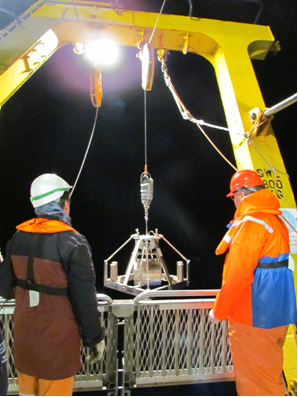
Luana, a PhD student in the School of Biological Sciences, is one of seven university students selected to take part in the Marine National Facility’s Next Wave program, which provides a unique opportunity for early career researchers and students of marine science to experience working on a blue water research vessel.
Luana and her fellow ship-mates are documenting their adventures – the giant squids, intimidating equipment, nausea and bunk beds – via daily posts in a blog.
This particular voyage sees former School of Biological Sciences member, Dr Sebastian Holmes (now at the University of Western Sydney), as Chief Scientist on board the Southern Surveyor leading the students on an 11-day research trip from Tasmania to Western Australia.
Leaving Hobart on Saturday 13 August, the research team – comprising students from the Universities of Western Sydney, Sydney, New South Wales and Western Australia – are making their way across the Southern Ocean and up towards Perth, where they plan to arrive in Freemantle on Tuesday 23 August.
On the way, Dr Holmes will lead the students in collecting data for an impressive range of research projects:
– discovering deep water meiofaunal isopods,
– examining how much plastic is in Australian waters,
– determining the source and sinks of iron in shelf waters,
– evaluating the spatial and depth distribution of the gelatinous component of plankton,
– measuring the isotopic signatures of surface productivity along the transit, and
– examining the distribution of plankton from Hobart to Fremantle
The data Luana obtains from isopod sampling will contribute to her PhD thesis – conducted with Dr Nate Lo – investigating the phylogeny and biogeography of deep sea isopods.
Whilst living aboard an oceanographic vessel, the students will be carrying out experiments and getting practice at using specialised oceanographic research equipment such as neuston nets, CTD (conductivity, temperature, depth) sensors, BOAGS (benthic, optical, acoustic grab sampler), beam trawls, epibenthic sleds, and Smith-Macintyre grabs.
